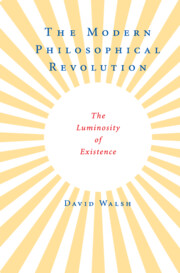Book contents
- Frontmatter
- Contents
- Preface
- Introduction
- 1 Kant's “Copernican Revolution” as Existential
- 2 Hegel's Inauguration of the Language of Existence
- 3 Schelling on the Beyond of Existence
- 4 Nietzsche: Philosophy as Existence
- 5 Heidegger's Achievement Despite the Betrayal of Philosophical Existence
- 6 Existence Without Refuge as the Response of Levinas
- 7 Derrida's Dissemination of Existence as Différance
- 8 Kierkegaard's Prioritization of Existence over Philosophy
- Epilogue: Modernity as Responsibility
- Works Cited
- Select Bibliography of Secondary Sources
- Index
1 - Kant's “Copernican Revolution” as Existential
Published online by Cambridge University Press: 05 June 2012
- Frontmatter
- Contents
- Preface
- Introduction
- 1 Kant's “Copernican Revolution” as Existential
- 2 Hegel's Inauguration of the Language of Existence
- 3 Schelling on the Beyond of Existence
- 4 Nietzsche: Philosophy as Existence
- 5 Heidegger's Achievement Despite the Betrayal of Philosophical Existence
- 6 Existence Without Refuge as the Response of Levinas
- 7 Derrida's Dissemination of Existence as Différance
- 8 Kierkegaard's Prioritization of Existence over Philosophy
- Epilogue: Modernity as Responsibility
- Works Cited
- Select Bibliography of Secondary Sources
- Index
Summary
There are many contenders for the starting point of the modern philosophical revolution. Descartes is surely worthy of consideration, as are Leibniz and Spinoza in their different ways. Nor should we underestimate the empiricism inaugurated philosophically by Locke. Hegel considered Francis Bacon and Jacob Boehme to be fitting representatives of the two components, experimental and speculative, of the modern mind. Intellectual historians have increasingly focused on the crisis of late medieval thought, especially as manifest in nominalism, as the turning point of the modern spirit of self-assertive investigation of nature. Others have identified the rise of Gnosticism and the irruption of esoteric religious movements within Christianity as the decisive events that formed the modern consciousness of epoch. This is, of course, to abstract entirely from the large pragmatic developments in science and technology, industry and commerce, society and politics that propelled the enormous engine of modernization. The omission of the latter can be justified, however, on grounds of relevance. We are not painting a comprehensive picture of the emergence of the modern world, but attempting to delineate the essential features of its self-understanding. Myriad factors make possible the world in which we live, but they do not constitute its meaning. To discover what our world is about, we must interrogate what we think. Among the many avenues of self-interpretation available to us, philosophy furnishes a uniquely articulate self-awareness, and among modern philosophers Immanuel Kant can lay claim to having inaugurated its most explicit self-examination.
- Type
- Chapter
- Information
- The Modern Philosophical RevolutionThe Luminosity of Existence, pp. 27 - 75Publisher: Cambridge University PressPrint publication year: 2008



